K-Pop Demon Hunters: A Lesson
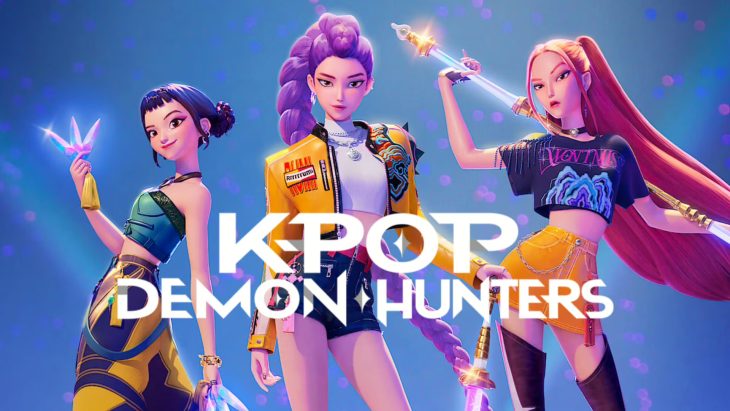
Good afterevenmorn, Readers!
If you haven’t heard of Netflix’ surprise movie sensation, I almost envy you. This movie is everywhere. It’s a phenomenal hit; becoming Netflix’ second-most viewed movie and has its songs everywhere on the Billboard top 10. The song Golden has hit the charts at number 1 in many places. It even, this weekend just passed, did something I don’t think I’ve ever seen before. It enjoyed a theatrical release just over two months from its initial release on the aforementioned streaming platform. I learnt about it too late to acquire tickets, and I’m quite sad about it.
I watched it. I loved it. I have already reviewed it, so you won’t be getting a rehashing of a review from me here. Instead, I want to talk about what K-Pop Demon Hunters says about original content, audiences, and how wrong some decision makers are about both.
There may be some spoilers. There definitely is at least one piping hot take. Let’s go.
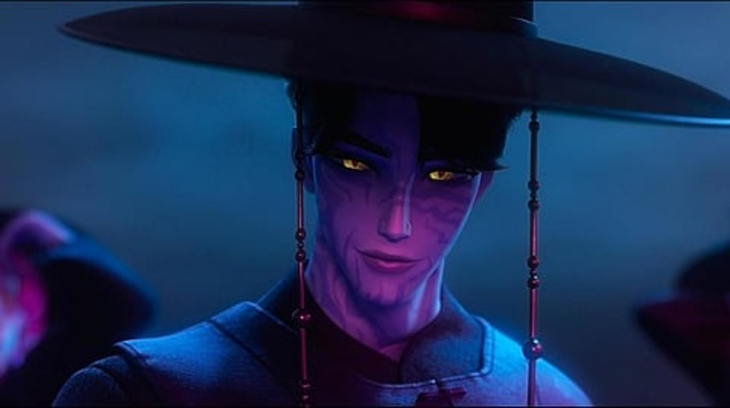
The movie’s success probably surprised Sony as much as anyone else. In fact, I know it must have. They sold it to Netflix with a deal that gave Netflix pretty much everything. If Sony knew the magic they had on their hands, that would not have been the case.
According to Forbes Magazine, the movie took $100 million to make, and the rights were sold off to Netflix with the expectation that it would be just another thing on Netflix to be watched and forgotten about. But that’s not what happened, and the $20 million Sony made from the sale pales in comparison to the film’s actual earnings — not to mention song sales, merchandise, and the new short-run theatrical release.
Look, $20 million is nothing to be snuffed at. What I wouldn’t give for that amount of money. But compared to what is actually happening, Sony is losing “big” as the Forbes article put it.
When I learnt this, I was astounded. K-Pop Demon Hunters was a great movie; tonnes of fun, great music, many laughs, real heart. There are so many elements that anyone who spends any time of BookTok knows would be instant hits. Themes of sisterhood/found family, kick-arse ladies, and redemption are on offer here. Why on earth would Sony not see the potential it had? After much thought, I have a hot take or two about why.
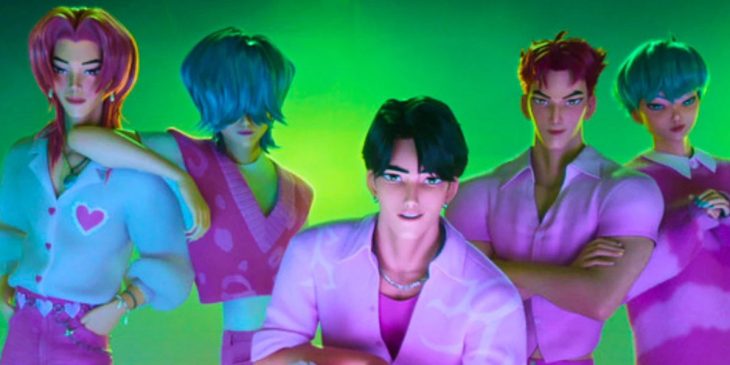
The first hot take I have is about how so many large studios seem allergic to original content. I’ve written about this before, both here and also on my personal blog. It’s frustrating as hell to many of us how studios will pass up on great original stuff in order to retread the same old tired franchises. I do vaguely remember someone in a position of power at one of these places say out loud with his full chest that people don’t want original content.
While it might be true that the pull of nostalgia is strong, and people do love watching franchise movies, that’s not all they want to watch. Still, I sorta understand. Original stuff is a risk. It might not land with audiences. And it’s much safer for the pocketbook to go with something you know people will show up to — either out of genuine love, or feeling obligated as it’s a franchise that they’ve supported from the off.
And sometimes, some genuinely great stuff is created out of these established franchises (looking at you Superman), that is fun, and engaging, and full of heart.
Even still, if that is all that’s on offer, it gets old very quickly.
Of course I’m not saying that franchise films or adaptations should cease to be made (as an author, I have a vested interest in seeing the trend of book adaptations specifically continue). But I am saying that they earn enough for a studio to take a creative risk every so often, and studios should be taking those risks, but aren’t. It’s not about the craft anymore. Or, at least, that’s what it feels like.
In music it’s much the same. There is a craving for something new and different, which has led to the rise of genre-bending bands like Sleep Token and Ghost, or the popularity of YouTube channels that cover modern pop songs with ancient instruments and in ancient styles. K-Pop itself has been very popular for quite a while now, with kids knowing more about their favourite “bias” than I shall ever know about any musician I like. Hozier is Irish. Sleep Token are British. That’s the extent of my knowledge of those two, even though I love their music so much.
I’m sure that Sony fully believed that because this was an original story, with no built-in fan base (and, perhaps, completely underestimated the popularity of K-Pop as a musical genre here), that this little animation of theirs would not get the kind of notice it has clearly received.
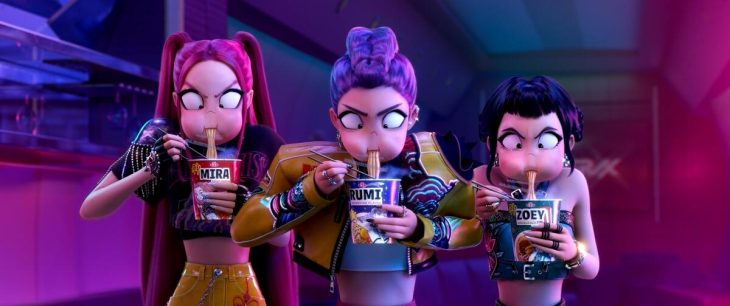
Even, apparently in the middle of killing a bunch of demons.
My next hot take is not so generous.
This story is, to its core, very Korean. Certainly, it’s written in English, with the majority of the music also being in English, but with a Korean and Korean-American cast, and writer/director, it draws a great deal from Korean culture. From the attitude of Celine, to the kinds of demons, and what their clothing might denote, the music, to the inclusion and significance of the spirit tiger and magpie, this story pulls from Korean culture in a major way. This includes the animation style, and the changes in it that which reinforce gags (see above) or other emotional moments.
Which, I think, is one of its strongest draws. I have written extensively about how refreshing and interesting stories built upon other cultural understandings are to me, as a reader. I’m sure I’m not the only one who feels this way. In fact, I’m so certain, I can prove it:
Star Wars got hugely popular, and a major aspect of that world was pulled directly from non-western philosophies. It was fresh and new, and folks latched onto it like crazy.
Growing up in Australia, I fully remember the release of Crouching Tiger, Hidden Dragon, and how that pulled Chinese cinema into the limelight for a while, before it once again fell into a niche category, before The Untamed once again put Chinese story-telling into the collective western consciousness; at least for a while, and for a very large, very active fan base. I still get The Untamed content on my feed from time to time. I now regularly consume Chinese dramas (I am going through a third rewatch of Arsenal Military Academy as I write this. I mean, not this second… but you know what I mean) because I love it so much.
I’m certain that the expectation is that Western audiences would not be able to connect with these deeply “other” cultural aspects. But that has not been the case in either my own interest in other cultures, or how readily other people are willing to learn, and learn to love cultural aspects that are not natively theirs. I know of people who are learning Kazakh because they adore the music of Dimash. I know of people who became so enamoured of another culture that they left everything behind to go live it.
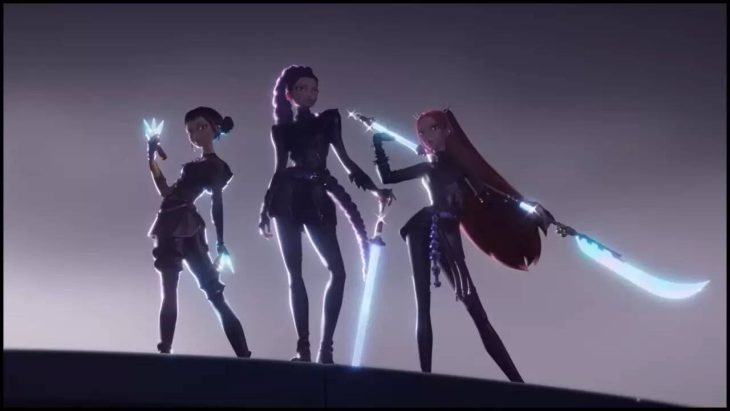
This goes beyond just the themes that are universal which make an appearance in K-Pop Demon Hunters — you know, the sisterhood/found family, the embracing and acceptance of one’s own self, love and redemption. These themes seem to resonate no matter the culture. It’s more than that.
In the comments of every video or article that has crossed my desk about this movie, there is always someone explaining the spiritual significance or art history of the various aspects in the movie that Western audiences might not know, and always, always, a flood of replies gushing about how this person did not know that, or how that person now loves the scene even more because of this new information. It has resulted in a cross-cultural education that is really beautiful to witness, actually.
I truly think that the people making decisions in these large creative projects forget just how appealing something new is, and how interested people actually are in ideas and manners of thought that are foreign to them; particularly in service to the fiction they consume. It’s insulting, really, because in the assumption that Western audiences cannot relate to other cultures is the idea that we are too close-minded, too incurious, too prejudiced to be able to relate to something that isn’t ours.
I reject that notion with my entire being. Not just because of my own curiosity, but because I’ve seen it everywhere I look. Not just with K-Pop Demon Hunters, but in all kinds of media from all corners of the world from all kinds of people.
Studio execs should give Western audiences more credit than they currently do.
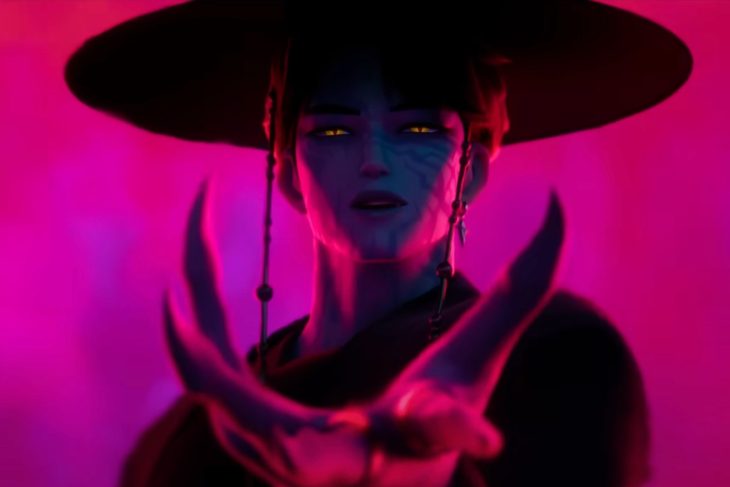
K-Pop Demon Hunters got huge despite there being nearly nothing done to market this film. All this buzz came from word of mouth. In some case folks were playing the songs before they knew they came from a movie. The songs are absolute bangers, to be fair.
Neither of my hot takes are confirmed or anything. They’re just from my own observations and assumptions (which could very well be quite wrong, I will admit). But the success of this film does prove one thing:
Original content is worth taking a risk on. People are hungry from something new in the creative spheres, and underestimating that desire can be a very expensive mistake to make. K-Pop Demon Hunters is a lesson. I wonder if it will be learned.
If you haven’t seen the movie yet, I do recommend it. I had a great time with this one.
Also, if anyone wants to send me a very large plushy of this guy, I would not be offended:
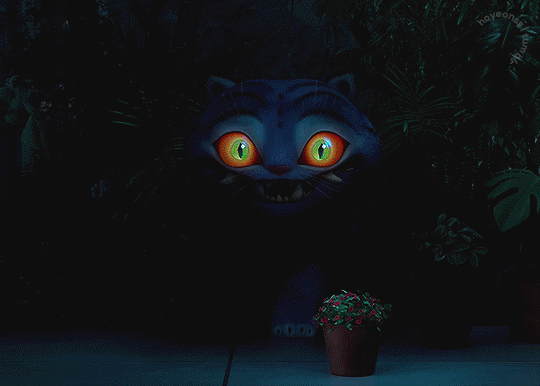
When S.M. Carrière isn’t brutally killing your favorite characters, she spends her time teaching martial arts, live streaming video games, and sometimes painting. In other words, she spends her time teaching others to kill, streaming her digital kills, and sometimes relaxing. Her most recent titles include Daughters of Britain, Skylark and Human. Her next novel The Lioness of Shara Mountain releases early 2026.
Huh. Perhaps I need to go away to the wilderness more often, if going functionally off-grid will mean more of this coming back to multiple authors touting the same unexpectedly-good entertainment. This is the second time someone has mentioned this movie in as many days as something to seek out. The first one did not mention the supernatural cat who is having a very relatable experience– excellent animation of the pupils when he hears the flowerpot clank to the ground. If They don’t create stuffed animals of that cat that have glow-in-the-dark resin eyes, then They’ll have missed a trick almost as badly as there never having been any “C to shining C” USB charging cables in the U.S.
Agreed, the cultural novelty and original creation aspects are HUGE factors in its success. I do think that the priming runs a little deeper, though, probably starting back in the ’90s with the “be ashamed– be very ashamed” generation.
**Begin Opinionated Tirade.**
When the people who grew up during the ’60s civil rights movement hit policy-making age, a dramatic shift in education strategies across the English-speaking world happened from the perspective of the child being educated. Suddenly, our education and entertainment started telling us we needed to be ashamed of ourselves because of colonialism and racism. [[[I will never forget the year I came back from my sojourn in England, which seemed to coincide with that shift. Up until 4th Year, the social message in school had been “treat everybody the same, because the differences that you can see are not the differences that matter,” but in 5th Year the social message was suddenly “you should be ashamed, because the Brits have been horrible to the Indians” (which left me reeling and thinking, “yes, it was wrong and should never have happened, and I have certainly learned not to do anything like that, but why should I be ashamed when I had nothing to do with it”). Then I moved back to the U.S., and was held back to be with kids my own age in 5th Grade, and was immediately subjected to the message “you should be ashamed, because White people have been horrible to the American Indians!” (Again, “yes, it was wrong and should never have happened, and I have learned not to do that, but I had nothing to do with it in the first place!”) Within two years, the TV and book entertainment aimed at my age group had also altered to the “be ashamed” message.]]] When our education and our entertainment insisted on telling us to be ashamed of and hate ourselves all the time, we got tired of listening to it and wanted a different message. So the first great anime/manga/manwha boom happened in the late ’90s/early ’00s. Suddenly, there was an accessible source of entertainment that was not threaded through with moral messages, it was just something fun. We hungered for that.
Behind the Shamed Generation (colonialism and racism) came the Shame-Squared Generation (racism and orientation), and the manga and anime sections got bigger and were joined by Asian storytelling in games, all of which were still usually lacking any “be ashamed of yourself” overtones. And now we are in the Shame-Cubed Generation (orientation and gender identity), which was raised on anime, manga, manwha, Asian games, and K-pop/J-pop by the Shamed Generation.
“K-Pop Demon Hunters” has hit just when the fiscally-powerful Shamed Generation, the newly-independent Shame-Squared Generation, and the still-under-the-sway-of-their-parents Shame-Cubed Generation are all ready and waiting for something “mainstream” that’s not part of an “existing fandom” to acknowledge and legitimize the enthusiasms that have been their refuge against self-loathing all of these years. There was no way that this thing could have flopped, short of entirely incompetent execution (see various Square-Enix movies).
Now, we’ll get to see how well the refuge withstands the social messaging engine noticing it. If the politicians running this year who want to appeal to the hip young voters pivot to anime-style imagery, I’m not sure if I’ll laugh or scream.
**End Opinionated Tirade.**
Perhaps the culture portrayed in “K-Pop Demon Hunters” is not entirely novel. Perhaps it is familiarly novel, and therein rests its power. There were definitely signs that Sony missed. Kudos to Netflix for spotting them.
So, closing question: Is milk tea or melon soda the better accompaniment for watching this movie for the first time?
I do recommend watching this with whatever beverage best suits a bright and bubbly, but ultimately heartfelt viewing experience!
I usually avoid watching anything new these days. Too much disappiontment, especially in things getting reviews as they usually are shill stuff. Remember a Simpsons where Bart and Lisa are outside a carnival scare show but it’s run down, broken, tapes don’t work, a repairman is working on lightbulbs – then “I’m sorry…” the barker says when they come out…? That’s how I feel when I listen to hype and start watching a show and it’s “Meh…” at best.
Our mass media is dominated by about 6 giant companies that suck the teat of corporate welfare and are ‘too big to fail’ AND get allowed to have monopolies and keep out competition. They usually just re-re-re-re-remake things – what choice do we have? And when they don’t sell they suck the teat of the Govern-NOT, fed by our tax or debt in our name. Case in point – Warner Brothers just got $90 million of our tax $ to pay for the BatWoman soapbox NPC tv show they can’t pretend anyone watches. Disney is getting $450 million back for Zeigler’s Snow whatever. Again only our $ or debt in our names, nobody they care about.
SO when something manages to sneak past their gauntlet without being chewed up and excreted to paste it tends to be a real hit. That’s also why Anime and Manga caught on so powerfully because it was a foreign product and during a rare time they needed to make $ they let already created content come in without too much interference. Animation had been 99% kids stuff or nothing and Comic Books suffered under the legacy of the Comics Code and domination by two giant comfortably numb to real change companies so the content of these was out of this world and even mainstream stuff did hot. But now Manga and Anime are adjusted for a “Modern Audience” so sanitized of things not normal by American/Western expectations and used as crude political soapboxes for the people doing the end work.
First off, while I have ZERO interest in this movie and am certain that watching even five minutes of it (or listening to five seconds of K-pop) would give me a seizure, this article is a welcome relief from the rather samey, aging fanboy content this site has been wallowing in of late so you have my appreciation.
Secondly, you are preaching to the choir here about our widening cultural desert of reheated IP. I’ve had it with every single franchise, remake, reboot, sequel/prequel, etc. and am glad to see someone addresss the issue here and would appreciate further commentary on the topic. There’s an enormous cultural appetite out there for new forms and voices and there always has been. We’re just in one of those deep valleys, the likes of which we’ve been through numerous times before. This one just seems especially vast.
As for the success of the film itself, I think the answer is far less complex and mysterious than most of the entertainment trades are making it. It reminds me of a conversation I had decades ago with a friend who worked at MTV back in the day. “MTV Raps” had just started to air and was an instant ratings monster, yet the executives who’d fought against airing it because they didn’t think their perceived white middle-American audience would be interested were just stunned and baffled even though my friend and all of her similarly 20-something co-workers all knew there was a huge audience out there. How anyone could be surprised that an enormous swath of young people weened on K-pop, manga, anime and computer animation wouldn’t lap this up is amazing.
Last, William Goldman’s adage that “Nobody knows anything” in Hollywood is as timeless today as it was 40 years ago. Coupled with that, the equally reliable phenomena of everything old being new again to someone who wasn’t raised with it is in full force so it’s no surprise that the kids who are hungrily buying books, vinyl, CDs and DVDs (and yes, they are) are also discovering the collective experience of watching a movie the love in a huge room full of other people who feel the same.
I mean… it might do that, but I do think you’ll be missing out! Also, thank you… I think?
I am also very mystified by how this took anyone by surprise. I’m also going to be a little cynical and doubt that the lesson this provides will be learnt. *heavy sigh*